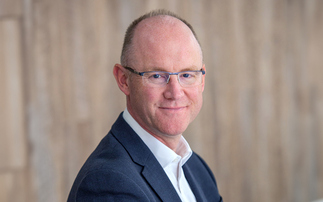Sanditon Asset Management CEO Rupert Tyer explains how the newly launched business aims to recapture the Cazenove formula as it prepares to welcome new hire Julie Dean.
Sanditon has accelerated off the starting grid since it began trading just five months ago, and Chris Rice and Tim Russell's new business received a further boost last month with the appointment of UK equity manager Julie Dean.
The arrival of Dean, who worked with Rice and Russell at both HSBC and Cazenove, has prompted suggestions Sanditon may represent the rebirth of the Cazenove fund business, 16 months after it was acquired by Schroders.
Sanditon chief executive Tyer (pictured) does not exactly dispel that notion: "Fifteen years on, we are recreating what they started", he said.
It does not make sense to say that in six years’ time we will have £5bn in assets and x many investment teams
His statement refers to the three managers' initial time together at HSBC Asset Management in the 1990s. But it is comparisons with Cazenove that are more understandable, given the managers' distinctive ‘business cycle' investment process became near-synonymous with the company once the trio joined from HSBC in 2002, and the fact that Tyer himself was a non-executive director at the business.
For now, however, that is where the similarities end. Tyer is unequivocal on the subject of further hires or rapid expansion.
"There will not be any hires from any of the other big names. We want to see products consolidate for the next two to three years. That can produce a great business in its own right.
"It does not make sense to say that in six years' time we will have £5bn in assets and x many investment teams. If you start with that kind of mindset, you forget what you are building in the first place."
Familiar models
He acknowledged, however, that the ideal vehicle for success in fund management often has a familiar look to it.
"I do not think there are many secrets to building a focused investment management company. It is about investment talent: that is the engine of the business. My role is to facilitate an environment where the engine of the business can operate efficiently."
The past 12-18 months have been particularly fertile for prototypes of this kind; Sanditon is far from the only business to have been launched in that period.
 In keeping with his managers' business cycle philosophy, Tyer identifies the trend as a recurring one, reminiscent of that seen earlier in his career.
In keeping with his managers' business cycle philosophy, Tyer identifies the trend as a recurring one, reminiscent of that seen earlier in his career.
"If you go back through history, there are points in every cycle where, in fund management, there seems to be an environment where people like to spin out of larger businesses," he said.
"You saw that in the early 1980s, and more recently in both the UK and the US, there was a big group of people who spun out in the early 2000s."
The imminent arrival of Dean - she will join Sanditon in early 2015 - is in keeping with this process, according to the CEO. When the manager's departure from Schroders was announced, a move to Sanditon looked, if not an open secret, a safe bet to say the least.
Tyer said Dean's move was not a result of unhappiness at her former employer, but rather a function of her desire to recreate the "fantastic working environment" enjoyed with Rice and Russell earlier in their careers.
Fund range
The company will launch the long-only TM Sanditon UK fund for Dean in the first quarter of 2015. Not surprisingly, the investment style will be in keeping with the business cycle philosophy, in line with her previous portfolios.
The fund will follow on from the long/short UK Select fund to be launched for Russell next month, but that is the limit of Sanditon's plans for now.
Tyer pointed out the company has just four funds registered in its original umbrella: the two forthcoming products, as well as Rice's long-only European and long/short European Select funds.
A fifth product is the investment trust that marked Sanditon's launch: a £50m UK and European equity vehicle run by Russell. Tyer explained the investment company was created "for a specific reason". He added Sanditon's overriding focus will be open-ended funds, not trusts or segregated mandates.
"Tim left Cazenove in 2011, so has not run an open-ended product for the past three years. We felt it could be difficult to launch such a fund and get massive support when he had been out of the market," Tyer said.
The "carrot" for investing in the trust, as Tyer describes it, was its ability to buy 20% of Sanditon equity on the same terms on which the business was capitalised. That worked out as a £200,000 stake in a business capitalised at £1m: an investment opportunity that is relatively rare nowadays, according to Tyer.
"The trust has a ten-year life and a completely independent board. It is at true arm's length. We have raised £50m and are never going to raise any more.
"There are few start-up asset managers where you can get a slice of the equity.
Over time, if Sanditon is successful, there is no reason to believe it will not become the trust's largest investment."
In this regard, the structure is similar to that offered by the Lindsell Train investment trust at launch in 2001. That trust's initial investment of about £65,000 in the wider Lindsell Train business is now worth more than £15m.
Another parallel, as Tyer pointed out, is that Russell was a founder investor in the Lindsell Train trust.
Tyer and Russell's professional history together began 20 years ago in the mid-1990s, when Tyer was head of Lazard's UK funds business at a time when Russell was head of UK equities. At Sanditon, the approach will be built on similarly close relationships, according to the chief executive.
Dean, when she joins, will be the company's ninth employee, following on from the four founding shareholders (Tyer, Russell, Rice and finance director Neil Canetty-Clarke), a head of operations and incoming deputy, a dealer, and senior investment director Guy Hill, hired to work with Rice.
A sales and marketing hire will be made in January, and Rice may add one other person to his team in the middle of 2015, but the scope for expansion is limited beyond that.
Tyer said: "We want to keep the total number of employees small. That does creates a more dynamic environment, and avoids the need to get involved in people management."
Tackling regulation
This business model is clearly looking increasingly attractive to some parts of the industry, seemingly bucking the notion that an ever-increasing regulatory burden makes it harder for small firms to establish themselves.
Tyer agreed the increase in regulation is not an insurmountable obstacle. Although he acknowledged the need for greater compliance functions has imposed increased responsibilities upon the industry, he points to related factors that may make a smaller business more, not less, compelling.
"Regulation has changed the environment in which we operate: you have to be much more cognisant in what you report. But people want to make a big thing of this. I would say, in broader terms, it has not changed that much."
The significant administrative industry that has grown up around investment management over the past decade has been helpful, he said.
"Ten years ago, large custodians and administrators realised there would always be a lot of people wanting to spin out, and geared up for that. Nowadays, there are far more service providers geared up to take on outsourcing from asset managers," he said.
"It is important to emphasise you cannot outsource compliance itself. But that is not to say you cannot outsource the monitoring. The other point is we have no legacy business, so we can cut our cloth accordingly.
"Businesses that have massive back books with high margins now have big decisions to make. That can mean more people striking out on their own."
The hardest part of starting a small firm, for Tyer, is the amount of time it takes to become regulated. But here too he looks on the bright side: it took Sanditon just over six months to gain approval, compared with reports of 12 months or more for some.
The latest regulatory issue flagged as having an impact on smaller asset managers is proposals to ban the use of share dealing commission to fund research costs, although European rules would not come in until 2017, and signs emerged last week that final proposals may be watered down.
Sanditon's investment approach should mean the impact these rules is limited, Tyer said, but he acknowledged the firm has already had "a lot of discussions" over dealing commission: "The business cycle approach is not founded on the analyst model. We are not massive users of [investment bank research]. I do not believe there would be a material impact on us."
Dealing commission may just be the tip of the iceberg for fund managers, given the greater scrutiny of fee structures now emerging from all angles.
Charging structures
Having been born into the clean share class world, Sanditon has set annual headline charges for its long-only funds at 75bps. European Select charges a pricier 125bps, with a 15bps performance fee. But Tyer described this as "at the low end of long/short equity".
He added: "We are trying to deliver uncorrelated returns, and think we are justified in using the performance fee if we can do that."
The long-only European fund also has an ‘F' share class, available to key distributors such as Hargreaves Lansdown, which has an AMC of 0.6%.
Tyer is forthright about the company's desire to launch preferentially priced share classes such as this: "We are not trying to build a big distribution model, so we need to rely on people who deal with reasonable volumes - those that really have the muscle."
This distribution strategy represents just one piece of the puzzle. Looking ahead, Tyer makes clear that Sanditon's own strength will come from a recognisable source.
"From a business point of view, people know the [business cycle] story. We have not changed anything in terms of how it works. In the long term, you have to deliver a quality product, and we are not just growing for the sake of it."
CV
Rupert Tyer
2013
Co-founder and CEO, Sanditon Asset Management
2011
Cazenove Capital non-executive director
2003
Founding partner, Cantillon Capital Management
1994
MD, Lazard Unit Trust Managers
1990
Joined Capital House Investment Management
1986
Began investment management career at Royal Trust Asset Management













